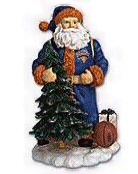 id you know that the idea of Christmas as a
family holiday is relatively new? That it dates from around 1850?
And that before this, it was a time of merriment, drinking in the
streets, general revelry and troublemaking? And that before this
time, gifts were never given to loved ones? And that such
gift-giving within the family can be traced directly to the
famous poem by Clement Clarke Moore, "'Twas the night before
id you know that the idea of Christmas as a
family holiday is relatively new? That it dates from around 1850?
And that before this, it was a time of merriment, drinking in the
streets, general revelry and troublemaking? And that before this
time, gifts were never given to loved ones? And that such
gift-giving within the family can be traced directly to the
famous poem by Clement Clarke Moore, "'Twas the night before Christmas?"
Christmas?"
Before The mid nineteenth century,gifts were given from the rich to the poor. It is a historical fact. The poor would go to the local church, or the estate of a nobleman--later any wealthy citizen--asking for alms. They might receive money, a meal, or some other treat. Consider the second verse of "We Wish You a Merry Christmas": "So bring us some pretty pudding…We won't go until we get some…so bring some right here." Carolers in fact demanded food.
The well-off gave gifts to their servants. The working classes took to the streets, singing songs and getting drunk. The singing of songs persists today, of course. What was different was the rowdy nature of this display. By the beginning of the nineteenth century, the rich had to take guards to protect their property, as the poor and working classes could not be trusted to respect the gate.
Clement Clarke Moore suggested a very different kind of holiday. Moore collected a lot of different elements together: Father Winter, St. Nicholas, and so on, from different cultures. Father Winter came to bring luck to your house over the winter. St. Nicholas came on St. Nicholas Day, December 6th, and dropped nuts and fruits into children's shoes (or stockings). Moore apparently originated the following innovations:
Why did this poem, written in 1822, have such a transformative effect? Evidently the idea was appealing to industry. What better way to induce people into a shopping spree? Indeed, from the mid-nineteenth century onwards, ads prominently featuring Santa Claus urged people to buy gifts. Thus was the trend of gift-buying spread. Not by innocent pure tradition, but by commercial interest. The tradition of gift giving and heavy commercialization spread concurrently, not consecutively, as most people assume. They grew hand in hand: in the 1930's, Coca-Cola ads were the primary image of Santa in society for the majority of Americans.
The transformation of the holiday from one of hooliganism into an evening to be spent quietly at home with the family was complete by the late nineteenth century. And it was real boon for retailers. Christmas, the combination of memory and desire…when we will do anything to replicate the "old, authentic" Christmas for our own kids. The time when love inescapably equates with monetary expenditure.
So, although it's natural to
complain about the commercialization of Christmas, it would be wise to remember that this is the nature of the beast. The ideal
Christmas--serene, contemplative, in the heart of the family,
enjoying the simple exchange of heartfelt gift-giving, untouched
by the soiling hand of commercialization--has never existed.
wise to remember that this is the nature of the beast. The ideal
Christmas--serene, contemplative, in the heart of the family,
enjoying the simple exchange of heartfelt gift-giving, untouched
by the soiling hand of commercialization--has never existed.
Let's not get what Hungarians call "deppy"--depressed. The holiday is better this way than it used to be. We can still get wasted at New Year's. Take a pro-active stance towards Christmas. Be corny. Be sentimental and force others to be the same way. Light candles, join hands, sing songs. Call everyone who doesn't cooperate a party pooper, but do it with a smile on your face. The bastards have got a hold on our wallets, but making the holiday special is up to us.
[Language
learning resources]
[Star Trek] [Golden
student bloopers] [Shop]
[Hungary] [Music]
[Magyarnyelvu honlap: Hungarian homepage]
[Home]